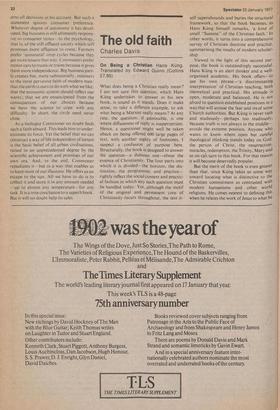Power games
Robert Skidelsky
The Poverty of Power: Energy and the Economic Crisis Barry Commoner (Jonathan Cape £5.50) The idea of a closed or closing circle has always fascinated the historical imagination. Civilisation, it is claimed, reaches a certain height of development and then, literally, falls back to earth. Such cycles were not just products of men's fancy. They occurred with monotonous regularity. Historians develoPed bizarre ideas to explain them. But actually the explanation was quite rnPle. All civilisations are based on cities. -Ireat cities are parasitical on, the countryside. As they grow they suck the countryside dry. But in doing so they destroy themselves. The countryside can no longer support the City and its works, So the city collapses, the Countryside takes it back, and the cycle starts up again. With the Industrial Revolutri°n it was believed we had finally broken .ree. The grand and gloomy Spengler apart, was held that science guaranteed expandTS 'wealth and thus perpetual progress. here was no reason.why a city civilisation s.hould ever collapse again. Now the circle !s said to be closing once more. We are tied `121 finite resources which our great urban e.ivilisations are consuming at an accelerat Ing rate. Meanwhile, the' starving billions el
aMOur at the gate, as once the barbarians
Tassed across the Rhine for their final ;ssault on bloated Rome. By one route or "other, Doomsday is certain, unless . . In a previous book, Dr Barry Commoner "eseribed the destruction of the `ecosystem c'sn which life ultimately depends. En this :cruelhe points the accusing finger at ,a13italism. By choosing the wrong fuels to 'uo industrial and agricultural tasks it uses till) dwindling sources of energy. By choosing tae Wrong wrong technologies to perform those :sks (cars rather than railroads for transPort, for example) it uses up increasingly
scarce supplies of capital. Production for profit should give way to production for life. 'The governing influence,' Commoner writes, 'should flow from the ecosystem through the production system to the economic system' rather than the other way round as it now does. Socialism alone can achieve a rational match of resources and tasks.
The argument is far more technical and complex than this summary suggests. It is actually a difficult book for a non-scientist to follow. But the effort is worth making. Commoner's determination, to step outside the bounds of his own discipline to grasp our crisis entire, is admirable. The result is equally admirable, though his conclusion is simplistic.
For the simple Doomsday idea of an impending exhaustion of energy resources, Commoner substitutes the much more complex notion of a 'mismatch' between energy and its tasks: the crisis arises from the way we use resources, not from their 'absolute' scarcity. The argument is based on the second law of thermodynamics. The entropy of the universe is constantly increasing. But what diminishes is not the world's stock of energy (which remains constant) but its ability to do work. It is this that must be preserved, as far as possible, by getting the best value out of a given amount of energy. The science embodied in the second law of thermodynamics will tell us how, For example, electricity is very efficient to drive the motor that agitates the clothes in the washing machine; but it is not a thermodynamically sound way to heat up the washing machine's water, because it is applied at too high a temperature for the job in hand. 'A very large gap exists,' Commoner concludes, 'between the minimum amount of work needed to produce the goods and services that we now enjoy and the much larger amount that we actually use to accomplish these tasks.'
Not only does our economic system use up far too much energy; it is incapable of developing optimum replacements for existing sources. Commoner is particularly scathing about the nuclear power programme. Nuclear power is an example of massive thermodynamic 'overkill.' Nor has anyone solved the problem of safely disposing of radioactive waste, and preventing accidents capable of killing 50,000 people at once. Because there is no profit in it, our economic system has completely ignored the possibility of harnessing the sun for earth's tasks. Solar energy, a virtually limitless source, can largely replace 'the dwindling, [increasingly] expensive, and environmentally hazardous non-renewable fuels' on which we now depend.
Commoner illustrates how our economic system chooses thermodynamically inefficient technologies by reference to agriculture, transport, and the petrochemical industry. But here one begins to doubt his own choice of villain. The 'expected rate of profit' gov erns all decisions in his account. But such a statement ignores consumer preference. Whatever degree of autonomy it has developed, big business is still ultimately responsive to consumer tastes— to the psychology, that is, of the still affluent society which still promises more affluence to come. Farmers prefer 'unnatural' crop cycles because they get more leisure that way. Commuters prefer motor cars to trams or trains because it gives them more independence. Big business partly creates but, more substantially, ministers to the most pervasive faith of modern man: that the earth is ours to do with what we like: that the economic system should reflect our wants; that we are emancipated from the consequences of Our choices because we have the science to cope with any difficulty. In short, the circle need never
close. •
As a biologist Commoner no doubt finds such a faith abs.urd. This leads him to underestimate its force. Yet the belief that we can construct a way of life independent of nature is the basic belief of all urban civilisations, raised to an unprecedented degree by the scientific achievement and promises of our own era. And, in the end. Commoner repudiates it—but in a way that enables us to keep most of our illusions. He offers us an escape to the sun. All we have to do is to collect it and store it in any amount needed —up to almost any temperature—for any task. It is a trite conclusion to a superb book. But it will no doubt help its sales.



































 Previous page
Previous page